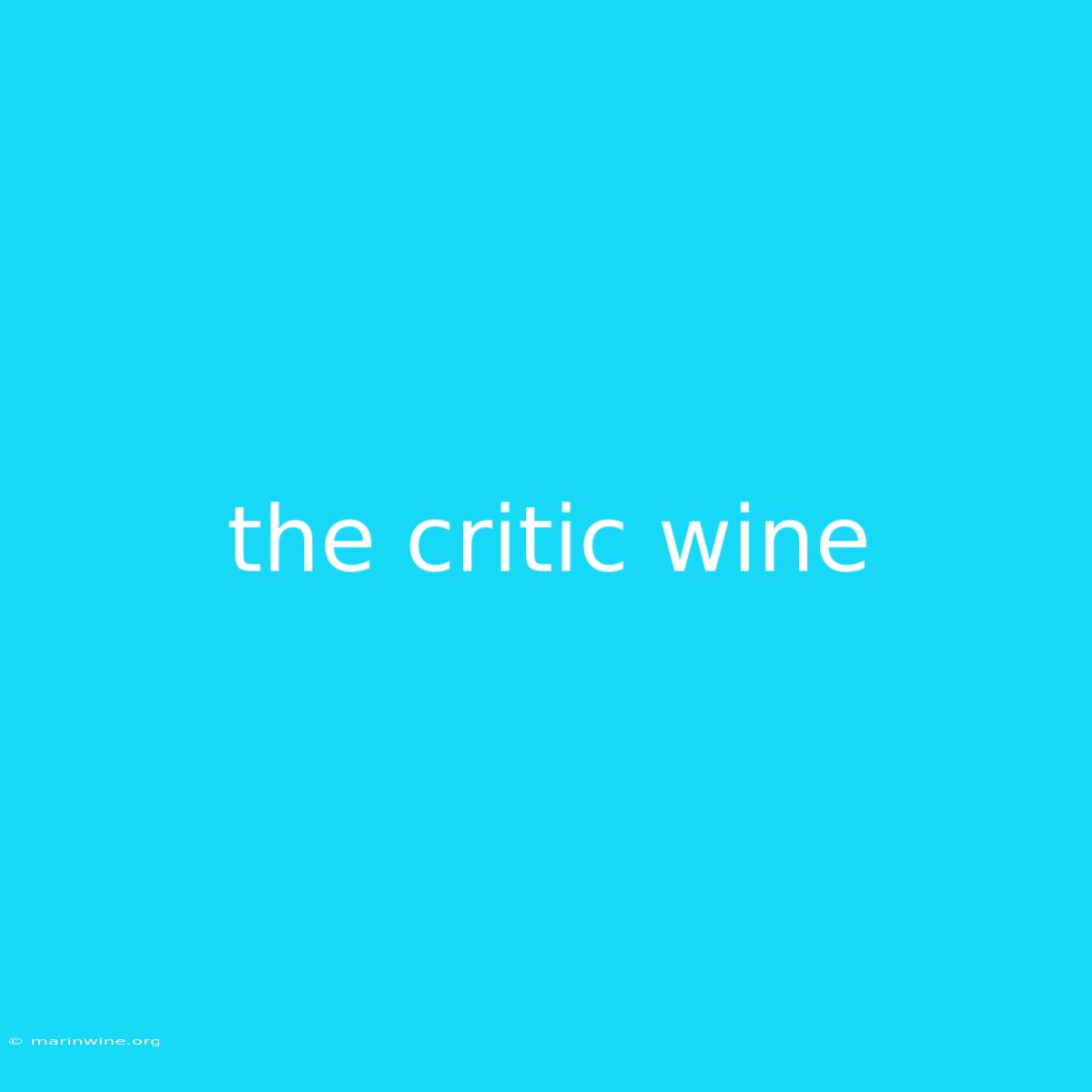Uncorking the Secrets: The World of Wine Criticism
Have you ever wondered what makes a wine truly exceptional? The answer, often hidden behind intricate descriptions and enigmatic scores, lies in the art and science of wine criticism.
Why It Matters: Wine criticism plays a crucial role in shaping our understanding and appreciation of this beloved beverage. It guides consumers, helps producers refine their craft, and fosters a global dialogue about wine's evolution.
Key Takeaways of Wine Criticism:
| Aspect | Description |
|---|---|
| Objective Evaluation | Utilizing sensory analysis and technical knowledge to assess a wine's quality |
| Subjective Interpretation | Reflecting individual preferences and cultural influences in the evaluation |
| Communication | Translating technical observations into accessible language for a broad audience |
| Influence | Shaping consumer choices, guiding production practices, and influencing the wine market |
The Critic's Palette: A Deeper Dive
Sensory Analysis: The Foundation of Wine Criticism
Wine critics employ a rigorous process of sensory analysis to evaluate a wine's qualities. This involves engaging all five senses to assess:
- Appearance: Color, clarity, and intensity.
- Aroma: Primary aromas (fruit, flowers), secondary aromas (fermentation), and tertiary aromas (aging).
- Taste: Sweetness, acidity, tannins, alcohol, and body.
- Finish: The lingering impression after the taste.
The Language of Wine: Deciphering the Critic's Code
Critics translate their sensory observations into descriptive language, using evocative words and comparisons to convey the wine's character. They may use terms like:
- Fruity: Red fruit (cherry, blackberry), citrus fruit (lemon, grapefruit), tropical fruit (mango, pineapple).
- Floral: Rose, violet, lavender.
- Earthy: Mushroom, truffle, forest floor.
- Spicy: Pepper, clove, cinnamon.
- Oaky: Vanilla, toast, coconut.
Beyond the Palate: Factors Influencing Wine Criticism
While sensory analysis forms the core of wine criticism, several other factors contribute to the final assessment:
- Vintage: The year of the grape harvest, which can significantly influence the wine's flavor and structure.
- Region: The geographical origin, climate, and soil type, which all impact the grapes and, consequently, the wine.
- Producer: The winemaker's skill, philosophy, and approach to production.
- Price: While not the primary focus, price can be considered in relation to the overall quality and value.
The Impact of Wine Criticism: From Consumer to Producer
Wine criticism plays a vital role in shaping the wine world:
- Consumer Guidance: Critics' reviews and ratings help consumers navigate the vast array of wines, making informed choices based on their preferences.
- Producer Feedback: Reviews provide valuable feedback to winemakers, highlighting strengths and areas for improvement.
- Market Influence: Critical acclaim can boost a wine's popularity and price, while negative reviews can impact its sales.
Understanding the Critic's Perspective
While wine criticism aims to be objective, it remains inherently subjective. Each critic brings their own unique palate, experiences, and biases to the evaluation process. Therefore, it's important to consider multiple reviews and cultivate your own taste preferences.
FAQ for Wine Criticism
| Question | Answer |
|---|---|
| What are the most reputable wine critics? | Robert Parker, Jancis Robinson, Antonio Galloni, James Suckling, and Wine Spectator are among the most influential critics. |
| How are wine scores assigned? | Critics use various scoring systems, typically ranging from 0 to 100 points, to indicate the wine's quality relative to others. |
| Is wine criticism just about taste? | While taste is central, it also considers factors like production, history, and regional context. |
| How can I learn to be a better wine critic? | Practice tasting wines, read books and articles about wine, and engage in discussions with other enthusiasts. |
| Do I need to agree with critics to enjoy wine? | Absolutely not! Develop your own palate and appreciate what you enjoy, regardless of critic's opinions. |
| Does wine criticism promote elitism? | While some aspects can appear elitist, the goal is to share knowledge and elevate the appreciation of wine for everyone. |
Tips for Navigating the World of Wine Criticism
- Explore different critics and styles: Read reviews from various sources to gain a broader understanding of the wine world.
- Consider the context: Think about the vintage, region, producer, and price when evaluating reviews.
- Trust your palate: Ultimately, your personal preference matters most.
- Don't be afraid to experiment: Try wines outside your comfort zone and discover new favorites.
- Enjoy the journey: Wine is a complex and rewarding subject; embrace the learning process and savor each discovery.
Summary by Wine Criticism
Wine criticism, a blend of sensory analysis and expert interpretation, serves as a valuable tool for navigating the world of wine. It guides consumers, encourages producers, and fosters a rich dialogue about this beloved beverage. While subjective in nature, wine criticism offers a framework for understanding and appreciating the complexities and nuances of wine.
Closing Message: The journey of wine exploration is a personal one. Embrace your own palate and let your curiosity guide you through the vast and intriguing world of wine criticism.

